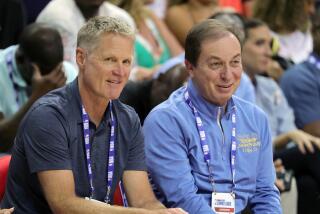Rawlings Accepts K2 Bid; Top Shareholder Doesn’t
- Share via
An angry shareholder is already calling “foul” over Los Angeles-based K2 Inc.’s announcement Monday that it will buy baseball equipment manufacturer Rawlings Sporting Goods Inc. for $84 million in stock.
The deal, which also includes the assumption of about $40 million in Rawlings debt, would be the first for K2’s new chief executive, Richard Heckmann. He has an aggressive plan to turn the ski and snowboard maker into a major sporting goods company by acquiring other name brands.
Yet Heckmann faces opposition from Rawlings’ biggest shareholder, Daniel Gilbert, who recently made an all-cash bid for the company at $8.50 a share, or about $69.1 million. Gilbert owns 15% of Rawlings’ stock.
“I am not going to vote for this, and I don’t think a lot of other shareholders are going to go for it,” said Gilbert, who is chairman of Livonia, Mich.-based Quicken Loans Inc.
“My deal was all cash, and we could have been closed in just a couple of weeks,” Gilbert added.
Heckmann, however, believes that Gilbert’s offer is nothing more than a swing and a miss.
Rawlings shares, he noted, jumped 9% on Monday to $8.93 on Nasdaq. More than 400,000 shares traded hands, about 15 times their average daily volume.
“Anyone who thought our deal was bad could have gotten out today, for cash, and made nearly 50 cents more than what Mr. Gilbert is offering,” Heckmann said. “The market has already spoken and has said our bid is better.”
Regardless, some think that both deals may be overvalued. An executive at a rival sporting goods company says he believes that K2’s and Gilbert’s offers are too high, given Rawlings’ lackluster financial performance in recent years.
Rawlings’ chairman and chief executive, Stephen O’Hara, said the board of the 115-year-old company decided to accept the K2 offer at a meeting Sunday night because it agreed with Heckmann’s vision of creating a large, all-season sporting goods concern.
“This deal was for how you would create a growth vehicle rather than how many expenses you can eliminate,” O’Hara said.
One question is whether Robert S. Prather Jr., who owns 10.3% of Rawlings, will vote against the deal. Prather, a former board member, is the second-largest shareholder and previously has gone up against Rawlings’ management. He is the CEO of Bull Run Corp., an Atlanta holding company that failed in an earlier attempt to acquire Rawlings. Prather did not return calls seeking comment.
Management owns about 7% of Rawlings shares.
For Heckmann, who became chief executive of K2 in October, a Rawlings acquisition would be the first piece of an ambitious plan to transform K2 into a Fortune 500 sporting goods maker by buying multiple brands. He pursued the same strategy when he was head of water company USFilter, building it from a small business into a behemoth that was sold to French conglomerate Vivendi Universal for $6.2 billion in 1999.
Besides skis, K2 also sells Ride and Morrow snowboards, bicycles, inline skates and the popular Shakespeare line of fishing gear.
“Rawlings is a No. 1 brand that adds to our No. 1 brands in other sports that are marketed to the same retailers,” Heckmann said.
He said he is confident that at least 51% of Rawlings shareholders will approve the deal, which would close in March.
But Gilbert, a lifelong baseball fan, is undeterred, saying the battle for Rawlings is “only in the early innings.”
He maintained that shareholders would be better off with less money in cash rather than the stock transaction, which he said may end up being worth about $72 million in stock by the time the deal closes.
Under terms of the agreement, Rawlings shareholders would receive 0.95 of a K2 share for each share they own. That number can change based on the average price of K2 stock during a 15-trading-day period that ends two business days before the close of the deal.
K2’s shares fell 4% on Monday to $9.48 on the New York Stock Exchange.
K2 and Rawlings have suffered from falling revenue in recent years. Rawlings earned $3.4 million on sales of $173.7 million in its 2002 fiscal year. It has not seen any meaningful increase in sales since 1998, and the company lost a combined $16 million in 1999 and 2000.
Gilbert blames Rawlings’ problems on “poor management and a lack of capital.”
“There is no good consumer-marketing effort, no effort at selling goods over the Internet, there is little global presence and no public relations effort, even though this is the most recognizable brand in baseball,” Gilbert said.
He also questioned K2’s financial strength. K2 lost $7.7 million on sales of $595 million in its latest fiscal year, though it swung to a profit in its most recent quarter.
More to Read
Inside the business of entertainment
The Wide Shot brings you news, analysis and insights on everything from streaming wars to production — and what it all means for the future.
You may occasionally receive promotional content from the Los Angeles Times.











